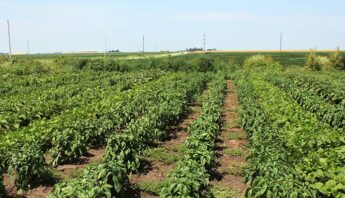Contacts:
Linda Wells, Pesticide Action Network, linda@panna.org, 563-940-1242
Paul Towers, Pesticide Action Network, ptowers@panna.org, 916-216-1082
December 11, 2012
Farmers Urge USDA’s Vilsack to Stop New GE Crops
Iowa farmers warn that livelihood, rural communities at risk from new genetically engineered seeds and the pesticides they’re engineered to be used with, including 2,4-D & dicamba
 Des Moines, IA — Organic and conventional farmers sent a clear message to U.S. Department of Agriculture chief and Iowa native, Tom Vilsack, that his agency needs to stop the approval of new genetically engineered (GE) corn and soy crops. Delivering petition signatures from farmers and farming supporters at a local USDA office, they warned of increased pesticide use resulting from these herbicide-resistant crops, and the higher cost and increased health risk that will follow.
Des Moines, IA — Organic and conventional farmers sent a clear message to U.S. Department of Agriculture chief and Iowa native, Tom Vilsack, that his agency needs to stop the approval of new genetically engineered (GE) corn and soy crops. Delivering petition signatures from farmers and farming supporters at a local USDA office, they warned of increased pesticide use resulting from these herbicide-resistant crops, and the higher cost and increased health risk that will follow.
“The suite of new GE seeds are a bad idea for farmers and farm communities,” said Denise O’Brien, an Iowa farmer, and former Obama Administration agricultural policy advisor. “The pesticide industry plans to introduce one troubling GE seed after another. Secretary Vilsack has an opportunity to turn off this tap and must act soon.”
Ten new herbicide-resistant crops are in the pipeline awaiting USDA approval, including Monsanto’s dicamba-resistant soybean and Dow’s 2,4-D-resistant corn and soy. Both 2,4-D and dicamba are known to drift — directly and through volatilization — and increased use poses a threat to rural economies and farmers growing crops not engineered to withstand application of these potent herbicides.
In addition, the introduction of herbicide-tolerant GE crops has driven pesticide use up by over 500 million pounds over the past sixteen years. “The dirty little secret of the pesticide industry is that genetically engineered seeds drive up pesticide use by design,” added, O’Brien.
Signaling the damage that increased use of 2,4-D and dicamba could inflict on non-GE crops — especially broadleaf plants like soy — farmers delivered a petition Thursday from over 43,000 thousand people from across the country, including over 1,045 farmers, calling on Secretary Vilsack to “stop the pipeline of new GE seeds.”
In addition to concerns about the impacts of increased pesticide use, farmers cite the emergence of so-called “superweeds” that have taken over more than 60 million acres of farmland across the country, especially the Midwest. Still, pesticide corporations continue to stack seeds with herbicide-resistant traits, tethering farmers to ever-more pesticide use and resulting in weeds developing resistance to the very herbicides intended to control them.
 "Herbicide-resistant crops may, in the short run, make it easy to weed out weeds, but even the 2012 Herbicide Guide from Iowa State University notes, 'History has proven time and again that herbicide-based weed management will inevitably fail,” said George Naylor, a conventional corn and soy farmer in Iowa. “One thing for sure is they lead to weeding out farmers and moving to a time soon when we will have farming without farmers."
"Herbicide-resistant crops may, in the short run, make it easy to weed out weeds, but even the 2012 Herbicide Guide from Iowa State University notes, 'History has proven time and again that herbicide-based weed management will inevitably fail,” said George Naylor, a conventional corn and soy farmer in Iowa. “One thing for sure is they lead to weeding out farmers and moving to a time soon when we will have farming without farmers."
Farmers also underscored concerns that a handful of pesticide corporations maintain control of the food and farming system. In addition to Monsanto and Dow — BASF, Bayer, DuPont and Syngenta, collectively known as the “Big 6” — dominate the world’s seed and pesticide markets, continuing to introduce new seeds and pesticide products in order to drive up marketshare. Therefore, farmers increasingly have less and less access to non-GE seeds.
“Policymakers have failed to address the impacts of control of the pesticide and seed systems, including increased risk to their livelihoods and the health of their families,” said Linda Wells, a fifth-generation Iowan and PAN organizer in the Midwest. “Midwest communities bear the brunt of a broken, anti-competitive agricultural system that favors pesticidemakers and limits farmer access to traditional seeds.”
Dow’s 2,4-D-resistant corn is the first “next generation” GE crop in the pipeline for USDA approval, with Monsanto’s dicamba soy and others not far behind.
Additional resources for reporters and editors:
- Background on 2,4-D corn
- Fixfood Video from Indiana farmer Troy Roush about “Dangers of Dicamba”
###







